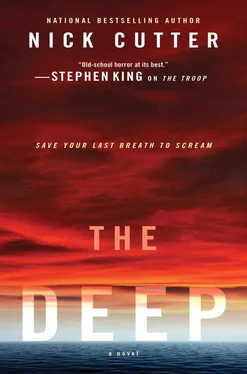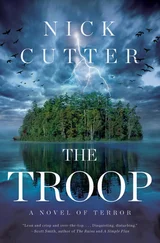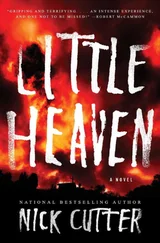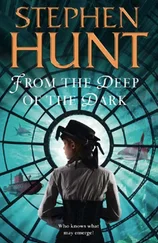Panting and whimpering and wagging its tail.
A CHOCOLATE LABRADOR RETRIEVER.It twined around Luke’s legs, nuzzled its snout into his crotch, and whined companionably.
“Oh, Jesus. Hey. It’s okay, boy,” Luke said, running his hands over the dog’s head. “Oh, wait—girl.”
The dog looked healthy, though a little too thin and clearly quite cold. Her hind legs were shaking. She rucked her snout under Luke’s armpit and rooted until her head popped out under his arm, giving his chin a slobbery lick.
One of Clayton’s lab animals? Did that mean the other specimens (Luke hated to think of them in his brother’s clinical terms) were out of their cages, too?
The porthole opened. Al’s boots appeared, her body gracefully following. She scanned the tunnel in both directions. Only then did her eyes settle on Luke.
“Your hands,” she said. “You’re cut.”
Luke nodded. “I didn’t exactly nail the dismount. I’ll live. What took you so long?”
“The porthole shut after you went out. It shouldn’t have. I had to disengage the pressure locks all over again.”
Al had a flashlight. When she flicked it on, Luke noted that they were situated in a gooseneck: the tunnel curved ninety degrees to the left and right, roughly thirty yards ahead on either side.
The tunnel was ovoid: narrower at the top, wider at the bottom. Pipes and tubes ran along the walls, each labeled with their use. Many appeared to be wrapped with… Christ, was that friction tape? It was —the stuff the army called “hundred-mile-an-hour tape,” as its manufacturers claimed it could hold a Jeep together at that speed.
My God, Luke thought with a dizzy species of dread. Is this fucking place held together with tape ?
Black foam had been applied around the entire tunnel in twenty-yard increments, in buckled seams running from floor to ceiling—Otto Railsback’s handiwork, had to be. Elsewhere Luke spotted signs of lowtech, on-the-fly fixes: baling wire and putty and soldering lead—the station had that shopworn, fix-me-up quality he remembered from the spaceships in the Alien movies.
Al gestured to the dog. “I see you’ve met Little Bee.”
“Little Bee?” Luke said. “Did my brother name her?”
“He named all of them.”
Luke should have known. Pchyolka and Mushka. “Little Bee” and “Little Fly,” in English. They were the dogs, in 1960, that were shot into space aboard Sputnik 3 . But the Russians miscalculated the satellite’s return trajectory; the poor dogs had been incinerated during reentry. It was just like Clayton to name his specimens after those doomed pooches.
“So where are we right now?” Luke asked. “What part of the station?”
“Docking and storage,” said Al. “Your standard dumping depot. You can see the start of the storage zone down thataway.”
She aimed the flashlight. Luke could make out a pile of discarded air canisters. The beam threw wavering shadows on the wall beyond. Long thin tendrils seemed to lick and lash just out of sight, only their serrate tips visible.
“Is it usually this dark? This cold?” he asked.
Al shook her head. “It’s running on phantom power. That’s not unusual—saving power is always key. But… the heat’s been cut, too.”
“What’s she doing in here?” Luke said, petting Little Bee.
“Dunno, Doc. That’s why we’ve been sent—to find out what’s the rhubarb. It’s why I’ve been sent, anyway. You’re more the PR guy.”
That chilling noise kicked up again: children’s feet dashing above them, through the coal-dark sea.
“You’ll hear it a lot,” Al said. “It’s just the pressure from outside. The Trieste is built to disperse it, in kind of a parabolic wave. Sounds freaky, huh? Like scuttling rats.”
Luke petted LB (as he’d decided to name her) until she quit shaking. She peered at him with a grateful gaze. The edges of her eyes were a tallowy white. She was probably suffering from hypothermia.
“We have to get this dog someplace warm, Al.”
“Right,” she agreed. “Let’s get at—”
The scream came from somewhere to the left, although in truth it was so piercing that it seemed to radiate out of the tube itself. Al broke into a run, moving in the sound’s direction. Luke dashed after her. LB remained pinned where she was.
Luke said: “Come on, girl. Let’s go. Move your ass.”
The Lab whined, her eyes rolling as the glow of Al’s flashlight vanished around the gooseneck.
Luke crouched down and cradled the dog to his chest. She whined again, mournfully this time— please don’t leave me —but began to stiffen when Luke set off after Al with her in his arms.
“Shhhh, girl. You’re okay.”
The dog softened into his chest. She kept her chin tucked tight to Luke’s shoulder, looking backward, studiously avoiding whatever lay ahead.
TUBES. SOME KINDof laboratory setup. A snarl of copper tubes spiraling at weird angles, like an octopus frozen in a huge lump of amber.
This is what I saw before, Luke told himself. Not the tentacles of some monster or mutant. Just a mess of lab equipment.
He avoided its spiky metal fingers while cradling the dog, which was already growing heavy.
More clutter: MRE packets and empty jugs whose mouths were ringed with crusted pinkness.
Shish-shish-shishshish-shish-shish…
That eerie pattering overhead again. Luke craned his head up; his skull rung off the ceiling. He cursed, his body set in an uncomfortable stoop. Never in his life had he been so bummed to be six foot two.
Portholes were strung along the ceiling. Luke saw nothing except the black water pressing down. If anything, the holes made the interior darker.
You may as well install a porthole in a coffin.
They reached a dead end. The tunnel had narrowed considerably; Luke’s elbows nearly scraped the walls. He and Al couldn’t stand side by side; Al stood slightly ahead, Luke hunched off her shoulder. The dog was squashed between them, though she didn’t seem to mind.
“Some of the tunnels bottleneck as they reach a junction,” Al said. “It fattens out on the other side.”
“Was that a scream we heard?” said Luke.
Al shook her head. “Steam, I’d say. Another release valve.”
Luke didn’t spot anything that looked like a release valve. They stood before a metal hatch with a single porthole. Al swung the flashlight. The ground was littered with junk—mostly busted glass, but also a gelatin-like lump that was dripping through the diamond grating. Its smell was spoiled and somehow malarial: the odor that might perfume an African village racked with disease.
Luke peered through the porthole. After ten feet, the tunnel widened into what appeared to be a chamber. Luke could just make out its scalloped roof and the edge of a cot. It looked cramped, but still much warmer and more hospitable than his present situation.
Luke set the dog down; his arms had grown weary. She bit his sleeve and held fast. Luke had seen this behavior with shelter dogs. Abandonment issues.
Al shone the flashlight through the porthole. “If anyone’s in there, they’re being coy about it.”
She tapped on the glass.
“We can’t get in here,” she said. “It only opens from the other side.”
“Why?”
“It’s designed that way. There are two exits, this one and another exactly like it on the other side. This area… primarily it’s storage, but the thinking was that in certain cases, it could be used as containment, too.”
“You mean a jail, Al. Right?”
Читать дальше












